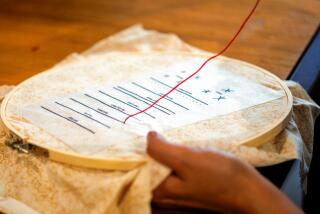Luxury Lingerie Feeding Manila’s Poor
- Share via
MANILA — Fidela Pizarra thinks she might make enough money to start rebuilding the home she lost in a typhoon.
Helen Rodica no longer has to beg in the streets to feed her family.
Their new opportunity comes from Marie de la Soudiere, a Frenchwoman who barks orders--and word of encouragement--to them in the small, second-story office of Thread of Hope for Economic Advancement, or THEA.
They are two of 40 women from impoverished squatter settlements who are making nightgowns for boutiques in the United States and a half dozen other places in the world.
De la Soudiere brought the women together last year.
THEA’s goal is to support a decent livelihood for destitute women who cannot qualify for government jobs or who “fall through the cracks” of state welfare and assistance programs.
It is one of hundreds of cooperatives, most supported by foreign and local charity organizations, that employ thousands of Filipinos who otherwise would live in poverty.
De la Soudiere, who worked with international relief organizations in Southeast Asia for more than a decade, established THEA with $2,000 of her own and $500 from a friend.
After a year in operation, the cooperative is exporting nightgowns under its own label to boutiques in Canada, Japan, France, Hong Kong, Spain and Australia, as well as the United States. Plans call for expanding sales to Britain and New Zealand.
THEA sells the gowns to exporters for the equivalent of $12 to $30 apiece, depending on the difficulty of the design. The seamstresses receive $4 to $6 for each garment they make. That’s an improvement over the Philippines’ minimum daily wage of $3.
Money left over from buying materials and reimbursing de la Soudiere for her investment goes into a fund for community projects, such as artesian wells and a day-care center for children of cooperative employees.
“With what I am earning here, I can start sending money to my husband in the province to buy materials to build our house, which was destroyed by a typhoon last year,” said the 58-year-old Pizarra.
“I have been sewing, on and off, for 16 years, but could not earn enough. Now I have a chance to earn more if I work a little bit harder.”
De la Soudiere, who is married to a U. N. official, said many such cooperatives fail because they do not produce quality products that fetch high prices in foreign markets.
She said many cooperatives also rely too heavily on charity. When donations dry up, so do the cooperatives.
“I really want to establish THEA as a very well-made brand of lingerie, like Dior,” she said. “Why not? Let’s dream.”
She sets high standards. She lectures cooperative members on the need for quality and sound business practices. Garments with loose stitching or poorly ironed creases are sent back to be done over.
“It’s her way of showing she cares,” said Delia Calanno, 41, who supervises cutting and sewing. “She is teaching us the value of time and meeting deadlines.”
“She’s a big help to us,” added Rodica, 32, a mother of two. “She took me off begging in the streets. Now I can buy enough food for my family and medicine for my sick husband.”
De la Soudiere expects to leave the Philippines in about six months when her husband is transferred, but she is optimistic that the cooperative will survive under the management of the Filipinos she is training.
She said the hardest part of her work has been to persuade the women that after generations of poverty, they can improve their lives through hard work. She encourages them to rely on themselves and not the government.
“They don’t allow themselves to dream yet,” she said. “They cannot imagine that they can really get out of the squatter camp, but now they are beginning to produce more, so something is happening.”
More to Read
Sign up for Essential California
The most important California stories and recommendations in your inbox every morning.
You may occasionally receive promotional content from the Los Angeles Times.













